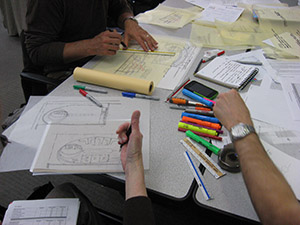
 |
UNIVERSITY OF IDAHO |
ARCH 463 & 463L
|
| Due 21 Sep | Due 12 Oct | Due 2 Nov | Due 30 Nov |
| LabX
#1 Discovering Precedent, Site, and Program |
LabX
#2 Designing for Site, Climate, & Performance |
LabX
#3 Creating and Using a Thermal Model |
LabX
#4 Final Design Performance Evaluation |
| InsideOut
A1 - B1 InsideOut C1 - D1 |
|||
| SiteX-1
or SiteX-1-Virtual contours, photo, photo w/contours SiteX-1 Boise Boise site, Boise Photo, Boise PDF |
* Note for Mac users below | ||
|
Software BPgraph BPsgain solar.xla BP Instructions (see p. 12) also use Climate Consultant and Opaque from UCLA |
Software use Climate Consultant and Zero Tool |
Software use SBEED and Climate Consultant |
Software use Sketch-Up or Revit plug-ins for Sefaira or CoveTool; use Zero Code; use Tally or OneClickLCA |
| Lab Examples (not perfect, but pretty good) | |||
|
Eller,
Henrie, Smythe Cardiel, Higbee, Pham |
Eller, Henrie, Smythe | ||
Site and team assignments Instruments
Four lab design exercises will be assigned during the term. A site visit exercise, “East City Park Site Analysis” will be accomplished concurrently with the first Lab Exercise. If your group is in Moscow and can visit East City Park, do SiteX-1, if not, do SiteX-1 Virtual. If your group is in Boise, do SiteX-1 Boise.
All the lab exercises will be presented as digital slide shows in the lab sessions.
Each presentation will consist of three parts:
Introduction—building type, site, climate
Lab Exercise findings
Conclusion
As a courtesy to your fellow students.
the slide shows are limited to 20 slides
and the presentations are limited to 15 minutes.
Points [2 pts] are deducted for exceeding these limits.
The Teaching Assistants who lead the discussion groups will grade these exercises.
Two- or three-person teams are required for the lab exercises and discussions. Teams-of-one face an impossible challenge, and teams of four or more will inhibit your learning. Be prepared to choose partners during your first lab. The weekly lab sessions will be used to assist you in doing the exercises.
Listed below are three types of labs for each exercise:
DEMONSTRATIONS: Hands-on experiences with instruments and software.
HELP SESSIONS: Classroom sessions with teaching assistant.
DISCUSSION SESSIONS: presentation of the exercise by lab exercise groups. See the detailed description below.
Accuracy, Synthesis, and Completeness Points
(20pts):
Technical errors and instances of failure to synthesize design and analysis as
well as failure to complete parts of the exercise will cause deductions from the
basic grade.
Clarity Points (5pts):
The graphic, verbal, and oral presentation of the exercise will be graded
subjectively. To be awarded the maximum bonus points your presentation must be
extremely clear, both graphically and verbally.
Penalty Points (5 pts max):
-1 for non participation in discussion sessions
-2 for whole team no-show at discussion
-2 for presentations that are over slide limit or time limit
-3 for late work
Maximum of 25 points.
Late or resubmitted work earns a maximum of 22 points.
The lab exercises are due at the beginning of the discussion sessions. At least one team member must be present at the discussion for full credit. You should include digital photographs of three-dimensional work such as site and building models in your digital slide presentation. The format for discussion groups will be similar to design critiques. At each session each group will be allotted 15 minutes to present its work. The other students will act as critics, commenting on the work presented and making comparisons to their own work. The critique is an instrument of learning in architectural education, therefore, everyone's thoughtful participation is vital. Comments and insights that go beyond "plugging in the numbers" are most helpful. The Teaching Assistants will merely act as facilitators during the discussions.